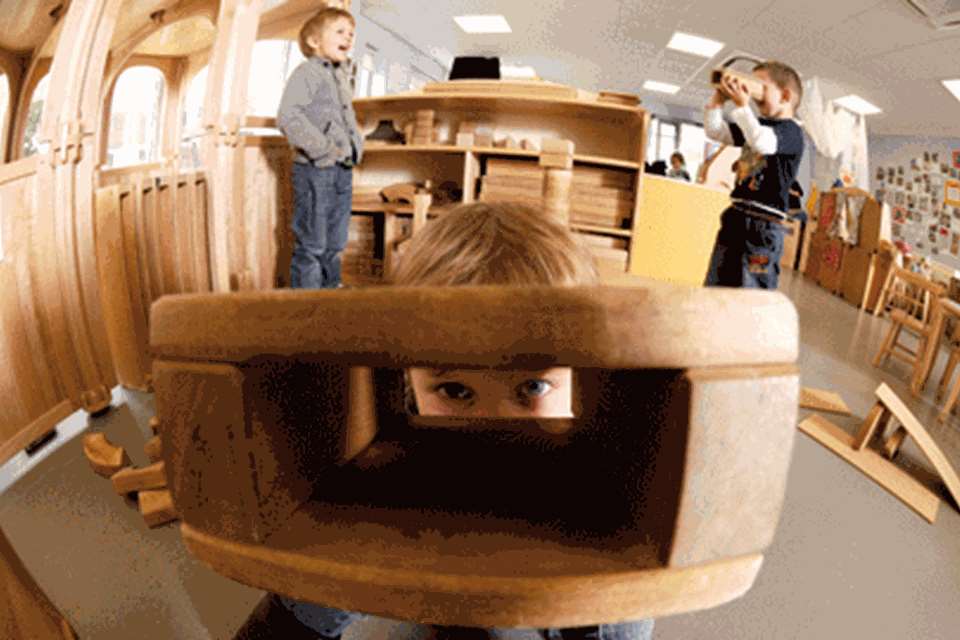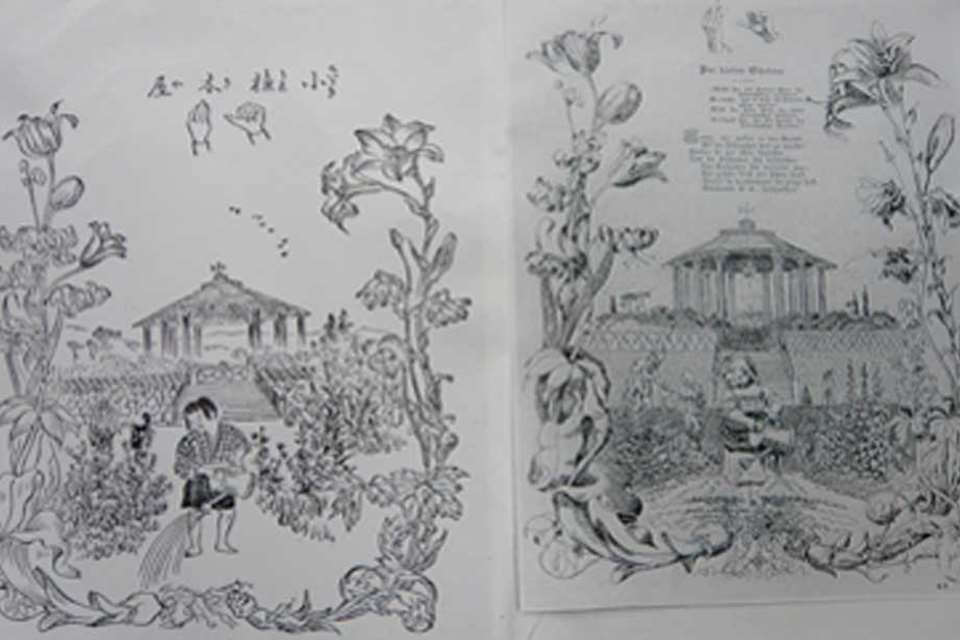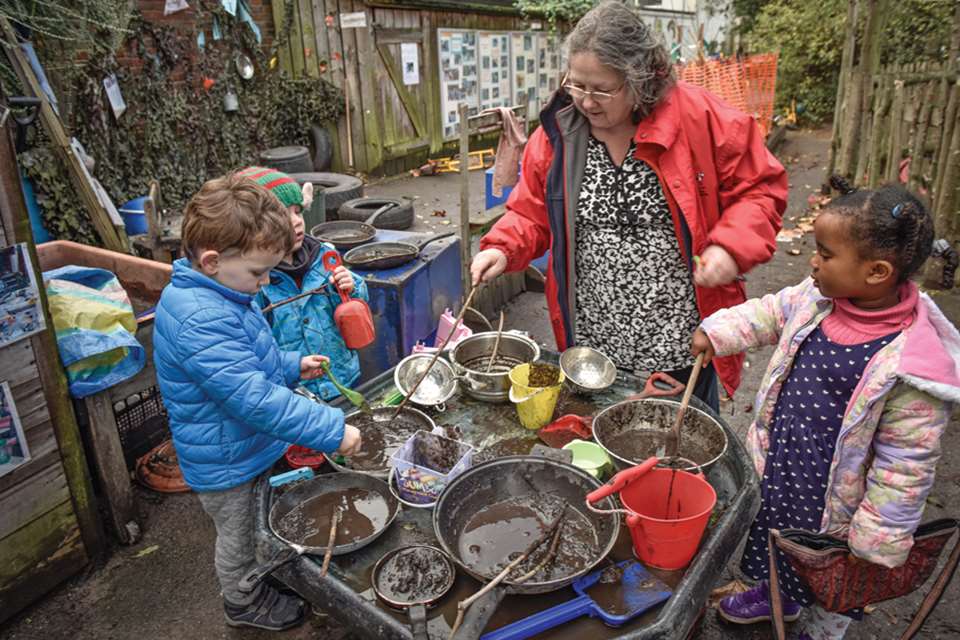Learning & Development: Froebel - Trusted ways
Sara Holroyd
Monday, April 6, 2015
Sara Holroyd on how Froebelian principles have been used to develop practice in Kolkata, India

The Froebel Trust began funding a project to support the development of early years education in Kolkata in 2012. The project is part of a wider initiative led by the Kolkata Police, which aims to engage with vulnerable individuals, families and communities in need of support and safeguarding - for example, children who are not attending formal school, at risk of offending, from broken families or living on the street.
At the heart of the initiative are Nabadisha ('new dawn') Schools, which are run by a number of NGOs and are based in police stations, where the local police inspector becomes a familiar figure.
The Froebel Trust is working with the Parivar Charitable Foundation, which is led by Anindita Tamta and supports eight such schools around Kolkata. They provide educational support, health checks, a snack, clothes and out-of-school activities for children who are the first generation in their family to attend school.
When the trust began its work in schools, I was joined by Jill Leyberg, with whom I trained at The Froebel College, Roehampton, and later by Kate Razzall, another experienced early years teacher. We also have the support of a translator, Asim Dutta.
The pupils are aged from two to 12 years. The sessions last for three or four hours and the curriculum mirrors that of the mainstream schools. The classrooms are small, some with no outdoor space, and the classes can have up to 40 children. The work is formal and book-based and consists mostly of rote learning.
A report by ACER, an Indian monitoring agency, has highlighted the lack of progress in children's attainment and achievement. It proposes a more practical and child-focused approach and to 'keep the textbooks aside'.
The government has promised a new education policy review.
In this context, we have worked with the teachers, most of whom have no formal teacher training, to explore how Froebelian principles can provide a framework for supporting a change in their practices. It was clear from the beginning that the ideals and aims that influence Anindita and her Parivar colleagues resonate clearly with Froebelian principles.
Of particular significance was the shared view that educational provision should acknowledge and care for the whole child and all aspects of their development.
This quotation from Rabindranath Tagore, a 19th century Indian poet and polymath, and still very much revered, also chimed with our Froebelian principles: 'Don't limit your child to your own learning for she was born in another time.'
FROEBELIAN PRINCIPLES
It was Friedrich Froebel (1782-1852) who first conceived of the idea of the kindergarten, and his influence on early years education in the UK and elsewhere is hugely significant, underpinning many of our current practices and provision.
Froebel's principles and pedagogy are well documented and described by Tina Bruce in Early Childhood Education and more recently Early Childhood Practice: Froebel Today and Bringing the Froebel Approach to Your Early Years Practice.
His principles, as outlined at www.froebeltrust.org.uk, are:
- recognition of the uniqueness of each child's capacity and potential;
- a holistic view of each child's development;
- recognition of the importance of play as a central integrating element in a child's development and learning;
- an ecological view of humankind in the natural world;
- recognition of the integrity of childhood in its own right;
- and recognition of the child as part of a family and a community.
At our first meeting with the Parivar teachers we gave an outline of Froebel's life and work. Throughout our training we referred to his principles, linking them to our observations and encouraging the teachers to do the same.
TRAINING
Our training with the Parivar staff began with an exploration of the sets of wooden blocks which are part of the 'gifts and occupations' that Froebel devised to support the children's learning. They offer opportunities for the children to use them in different ways and for different purposes; they are open-ended and encourage both creativity and imagination. These resources are not intended to be teacher-directed.
This latter idea was anathema to many of the Parivar practitioners.
Their experience of education is one where the teacher directs and leads all activities, where there is only one outcome and where actions and skills are repeated until they can be reproduced. There is little emphasis on understanding and applying knowledge and skills.
During the training some teachers created geometric designs, some small-world items such as houses and furniture, and some experimented with complex structures involving arches and bridges. We were able to share ideas about the range of learning that could stem from a box of blocks - shape, space, position, symmetry, geometry, balance, developing narratives, geography, imagination, creativity, and much more.
Resources and activities
We are aware that the resources available to these small schools are limited and that in the long term they would have to provide these themselves with limited funding. So the additional resources we introduced, based on Froebel's gifts and occupations, were gathered or bought relatively cheaply both in England and in Kolkata.
These resources included 'sticks and peas' (we used Blu-Tack instead of peas), materials for paper folding and cutting, clay, water and tessellating shapes, as well as songs, rhymes and stories.
We introduced these activities in the first school one by one, setting up the classroom and working with the children. During and after the sessions we shared our observations with the teachers and discussed our interventions.
On the last Saturday of each visit we ran a workshop where we shared the same activities with the practitioners from all the Parivar schools, giving them the opportunity to explore and discuss the materials.
In this way, the practitioners began to identify possible learning outcomes and how resources can be used with children of different ages. The impact of our change in provision was immediately obvious and the teachers quickly identified changes in the children's engagement, concentration and well-being.
The teachers commented that the provision was:
- 'Not boring';
- 'Learning is better when the activities are fun';
- 'If you (the teacher) give the ideas or solutions, the child does not have to exercise his/her brain'.
Principles
The Froebelian principles we most often referred to at this stage were:
- children should be active in their learning;
- start where the child is; and
- there are important links between different areas of learning which make all learning deeper and more robust.
However, we were also responding to comments such as:
- 'The children don't know what to do with the water'; and
- 'They can only tell a story if we tell them what to write'.
We addressed these issues in our after-school discussions using written observations and photographs. For example:
Sticks and tops Initially teachers were keen to direct the children to produce images that they suggested, for example a Micky Mouse or an umbrella. We encouraged them to stand back and observe and give the children time and space to explore and try things out for themselves. In this way teachers gained a greater insight into the child's thinking and interests;
Tops and bowls Exploring the tops alongside some bowls that we had used in telling 'The Three Bears' story. A girl spent 20 minutes exploring the volume of the containers, ordering them and then engaging in role play, cooking and eating a meal;
Water A child spent 25 minutes testing how the water flowed over all the different items in the water play. When he came to the ladle, he was interested in keeping the water from splashing out of the bowl and tried pouring from different heights in order to keep the water in the bowl. Apart from illustrating good scientific strategies, he had also remembered and understood the importance of not flooding the floor. This was a particular concern for some of the teachers; and
Block play model farm A major area for discussion during this visit was how the stories, songs and books we shared were having an impact on the content, style and imagination evident in the children's drawings and imaginative play. For example:
- We saw different representations of the troll from Three Billy Goats Gruff.
- Rather than always building a house with the blocks, we had electronic towers and working farms.
- Rather than children sitting on the floor for three hours, we saw children running around pretending to be butterflies and floating their paper boats down rivers made of fabric.
The teachers are beginning to plan and tell their own stories and even create props so that the children can act them out.
EVALUATION
It has been a pleasure working with the Parivar teachers, who have such a commitment to their work. They have become more confident, more willing to ask questions and more able to share their thoughts with us. They are also beginning to make significant observations, and some have begun to record these in individual child profiles.
There is a developing understanding that Froebelian practice is not a method - we are not imposing a system or a set of activities with defined outcomes. The principles enable the teachers to adapt their provision to the context in which they are working and to the resources, time and space that are available.
We found the following comments made during our last seminar encouraging and moving:
- 'We normally say, "You are weak, you cannot do this" - now all children have the same opportunities.' (This comment was made following observations of a child with a speech and hearing impairment whose behaviour and confidence was transformed over the week.)
- 'Children's own play is important ... (their play) makes (learning) sharp and deep.'
- 'We want children to be curious.'
- 'Each day is a new day - think of new ways to do things.'
Our next visit is in October and we have left the teachers to begin to explore their own ideas for story, song and additional resources.
Sara Holroyd is a tutor and Kolkata project leader at Froebel
MORE INFORMATION
- Early Childhood Education by Tina Bruce (Hodder Education)
- Early Childhood Practice: Froebel Today edited by Tina Bruce (Sage Publications)
- Bringing the Froebel Approach to Your Early Years Practice by Helen Tovey (David Fulton).









